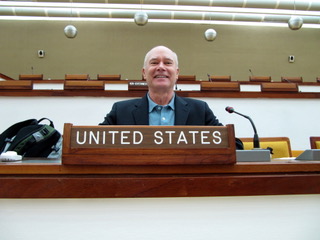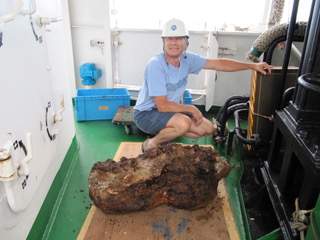When James Hein (Earth Sciences ’73, Ph.D.) entered the Earth and Planetary Sciences Department as one of its first doctoral students in 1969, he had a consequential decision to make—study the oceans or the planets. A proponent of hands-on learning, Hein chose oceanography where fieldwork would be more easily accessible. This decision shaped a career that took him to the depths of the ocean floor and to 75 countries around the globe.
His lifelong research is as vast as the oceans he explored. His Ph.D. thesis, using ground-breaking sedimentology techniques to study plate tectonics, was published in top geophysical research publications and caught the attention of the United State Geological Survey, where he was recruited and worked for 45 years. He became internationally renowned for his work in interdisciplinary research in geology, oceanography, geochemistry, and mineral deposits.
Now retired, Hein is acutely aware of the need for the next generation of scientists to continue deep-ocean exploration, as current research is influencing green energy, land resilience, and climate change.
“There is still so much we need to learn about the ocean, and there are not enough scientists. UC Santa Cruz needs to keep providing brilliant researchers,” said Hein, who was a Teaching Assistant during his doctoral program and taught courses at UCSC throughout his career.
One way he is ensuring the pipeline of scientists continues is by establishing an endowment to support Earth and Planetary Sciences (EPS) students who are focused on blue water (deep ocean) research.
“I had Ph.D. students who utilized funds from other endowments to attend conferences or participate in research that was of great value to their careers. I want to ensure that others had those same opportunities,” Hein said.
Hein’s career was shaped by the experiences and the people he collaborated with at UC Santa Cruz. One of his graduate courses was instrumental in developing unique skills that effectuated his global reputation.
“They invited world-famous field geologists to teach this particular course. Each geologist took us on field excursions that related to their area of expertise. They took us to the Rocky Mountains to look at thrust faulting, to the Sierra Nevada to study batholiths, and a large selection of other key geological sections. “The skills I learned enabled me to become one of only a few people in the world that did both land-based and deep-ocean geological research.”
Based on this global experience in land and off-shore geology, Hein brought several hundred international researchers from both practices together in a program he designed for the International Geological Correlations Program; he led the program for 15 years. In addition, he represented the United States Department of State as its chief scientific advisor to the International Seabed Authority, comprised of 168 Member States and the EU, and participated in the Council and Assembly meetings in Jamaica for 17 years.
“It’s been a fascinating career, but I couldn’t have done it without collaborations, connections and curiosity,” said Hein. “The people at Santa Cruz were brilliant thinkers, and the classes were amazing.”
His insatiable curiosity and fervor for data led to authoring and co-authoring more than 700 papers and abstracts. He encourages current EPS majors to stay curious, become lifelong learners, keep their connections open, and become expert writers.
“Connections and collaborations are key in this field,” he said. “But curiosity will propel you forward. I value education and like learning and using data to understand what nature is doing. I’ve been one of the luckiest people in the world to be able to work with amazing colleagues and scientists all over the world. I hope this endowment will open doors for the next generation to collaborate, connect, and expand their curiosity and knowledge.”




